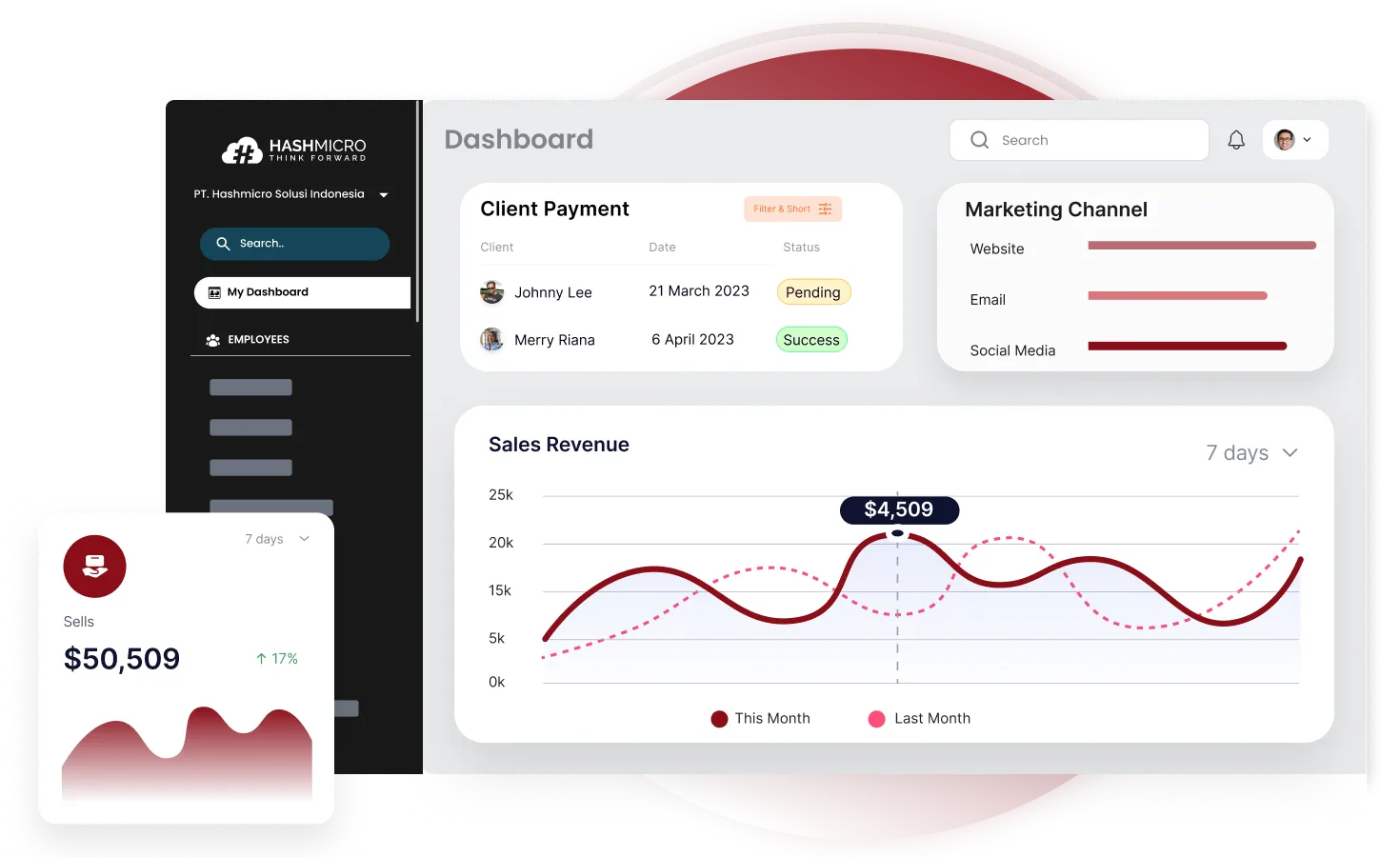Are sales and marketing teams struggling to coordinate customer data and communication? Without CRM automation, businesses often face scattered customer touchpoints, missed follow-ups, and inconsistent messaging. This inefficiency can erode customer experience and hinder growth.
In 2024, Singapore’s CRM software market generated an estimated US$263.2 million in revenue, reflecting a strong shift among local businesses toward automation tools that optimize customer interactions, boost operational efficiency, and support digital transformation across industries.
Traditional CRM workflows tend to be slow, error-prone, and lacking synchronization between teams. Tasks like updating customer records, tracking communication, or aligning marketing and sales efforts become manual and time-intensive. As a result, companies risk wasting both time and potential revenue.
Luckily, CRM automation tools offer a change. They help businesses centralize customer interactions, automate follow-ups, and deliver personalized outreach efficiently. Want to know which features make the biggest difference and how ERP integration can enhance this further? Let’s explore.
Key Takeaways
|
What is CRM automation?
CRM automation refers to the use of technology to eliminate repetitive tasks across sales, marketing, and customer service workflows. It allows teams to streamline how they manage leads, engage with clients, and maintain customer relationships, without manual input for every task.
Rather than logging calls or sending follow-ups manually, teams can automate these actions using CRM marketing automation features. This shift reduces human error, saves valuable time, and allows staff to focus on strategy, customer engagement, and conversions.
Additionally, sales automation CRM tools help standardize tasks like contact creation, quote generation, and meeting reminders. With these functions running automatically, teams can work faster, collaborate better, and maintain data accuracy across the customer journey, making it a key differentiator when evaluating CRM vs PRM for partner management.
What Are the Benefits of Crm Automation?

CRM automation transforms how teams operate by removing the routine tasks that slow them down. Instead of spending hours on admin work, your staff can focus on delivering value, whether that’s building relationships, optimizing campaigns, or closing deals faster.
1. Smarter campaign execution with less manual work
With the help of crm marketing automation, marketers no longer need to micromanage every campaign detail. Automated systems handle scheduling, A/B testing, and performance tracking. This gives teams the freedom to focus on creativity and strategy.
Marketing automation also enhances lead prioritization. The system assesses visitor behavior and assigns scores based on likelihood to convert. As a result, your team spends more time nurturing quality leads and less time sorting through cold prospects.
2. Accelerating sales through real-time insights
Sales teams benefit from more than just efficiency gains. With sales automation crm, reps receive alerts when prospects take meaningful actions, such as viewing pricing pages or replying to emails. These real-time insights support faster, more strategic follow-ups.
CRM tools also streamline contact management. Information updates automatically, so reps never lose track of their pipeline. As a result, the sales process becomes more predictable, and conversion rates improve.
3. Elevating support experiences without overloading agents
Customer service teams often juggle dozens of simple tickets that could be resolved in seconds. With a CRM ticket management system, AI-powered chatbots handle common issues instantly, while complex cases are routed to the most suitable agent.
This setup not only reduces customer wait times but also ensures agents spend their time where it’s most impactful, handling nuanced problems and creating memorable customer experiences.
4. Boosting overall efficiency across departments
Beyond individual teams, CRM automation creates ripple effects across your business. It shortens sales cycles, improves response times, and allows teams to work in sync without constant manual coordination.
Ultimately, automation supports a more agile business model. Teams work smarter with less manual burden, data becomes more reliable, and customers receive timely, personalized service at every stage of their journey.
What Is the Primary Function of CRM Automation?
CRM automation serves as the foundation for efficient customer management by taking over tasks that consume time and create delays when handled manually. While it covers a broad range of functions, there are several essential capabilities to consider when choosing the right solution.
1. Managing contacts with more structure and speed
A well-built CRM automation system helps centralize customer and prospect information. It captures essential details such as names, emails, phone numbers, social profiles, and company information, ensuring every interaction is based on accurate, up-to-date records.
2. Tracking leads through every stage
CRM automation allows sales teams to manage leads more efficiently from the first touchpoint to conversion. Features like lead scoring, tracking, and pipeline updates enable reps to follow up at the right time using reliable, real-time information.
3. Powering smarter email and marketing efforts
Marketing teams benefit from built-in tools for sending automated emails, welcome messages, and targeted follow-ups. CRM platforms also support list segmentation and campaign planning. These features help execute crm marketing automation strategies with precision.
4. Keeping your tools connected
The best CRM systems integrate easily with your existing software stack. From calendars and help desks to email platforms and project tools, automation makes collaboration seamless. Everyone gets visibility into client interactions without chasing updates manually.
5. Making sense of data with clear reporting
CRM automation provides access to customizable analytics and performance dashboards. With accurate and real-time metrics, your teams can make informed decisions. This supports both sales forecasting and campaign optimization based on actionable data.
Features to Look for in CRM Automation Tools

Not every CRM tool is created equal. While many platforms promote high-tech features like predictive analytics or AI integrations, it’s important to first focus on the essentials. The right set of core features will help your teams become more responsive, efficient, and customer-focused.
1. Smart segmentation for targeted outreach
One of the most valuable features is the ability to group contacts automatically. Your CRM should be able to sort customers based on behavior, purchase history, or engagement level. This makes it easier to run targeted promotions or follow up with high-value leads at the right moment.
2. Flexible rules for custom workflows
A good CRM offers more than just preset automations. Look for systems that allow you to define your logic, such as triggering an email reminder when a customer leaves their cart untouched for 24 hours. This kind of customization keeps your sales process aligned with real customer behavior.
3. Activity tracking that updates in real time
Manual data entry slows teams down and leads to mistakes. CRM automation should log every key interaction, like email opens, link clicks, or purchases, without requiring your staff to enter it themselves. This keeps contact records accurate and actionable at all times.
4. Seamless integration with your existing tools
Your CRM should easily connect with the software your teams already use. From ecommerce platforms and customer support tools to email services and calendars, integration ensures that data moves smoothly across systems and everyone works from the same information.
5. Automated task management and timely alerts
To keep deals moving forward, sales reps need more than just a to-do list. Choose a CRM that assigns tasks automatically based on customer activity and sends timely reminders when action is needed. For example, it can notify a rep if a key client hasn’t engaged in over 90 days.
6. Internal workflow automation that scales
CRM automation is not just about customer-facing tasks. It also improves internal coordination. Look for tools that automate workflows across departments, allowing teams to collaborate without needing constant updates. Some platforms even support no-code automations or AI-assisted task creation.
7. Proactive lead management
Finally, lead management remains a core function of any sales automation CRM. Your system should be able to score leads, monitor deal progress, and help reps stay focused on the opportunities that matter most. Personalized follow-up suggestions based on lead behavior can also improve conversion rates.
To explore how CRM automation can support your business growth, click the banner below to check the pricing of HashMicro CRM and learn how you may be eligible for support through the CTC Grant in Singapore.
How HashMicro ERP System Helps with CRM Automation

CRM automation is more impactful when integrated with an ERP system, uniting all departments on one platform. This provides sales, finance, and service teams with real-time data for faster collaboration and consistent customer experiences.
Connecting CRM with ERP eliminates duplicate data entry and errors. For example, converting a lead can automatically trigger an invoice, update inventory, or start a delivery, reducing delays and helping your team respond faster.
For companies in Singapore that want an integrated CRM-ERP system built for growth, HashMicro offers a solution designed to improve team performance and drive results. Below are the key features and how they benefit your business:
- Hash Quality Score
Automatically ranks leads based on potential, helping your team focus on those most likely to convert. - KPI tracking
Monitors daily performance so managers can make quick adjustments and keep goals on track. - Built-in team chat
Enables instant internal communication, reducing delays and improving team responsiveness. - Unlimited user access
Everyone can use the platform without extra fees, encouraging full team collaboration at scale. - Mobile access
Allows sales reps to update records and follow up with leads from anywhere. - GPS tracking
Helps monitor field activities and optimize routes for better efficiency and accountability. - B2B and B2C flexibility
Supports personalized workflows for both business and consumer clients without switching systems.
HashMicro CRM empowers businesses to automate more than just sales. It creates connected processes that improve lead handling, team performance, and customer satisfaction.
Conclusion
CRM automation offers more than just convenience; it drives real improvements in productivity, customer experience, and revenue growth. By streamlining routine tasks, prioritizing high-value leads, and enabling better coordination across departments, businesses can operate with greater focus and agility.
With HashMicro CRM, those benefits become even more accessible. Built with flexibility and scalability in mind, the system combines essential CRM features with the power of ERP integration. From lead scoring to mobile access and real-time KPI tracking, it supports teams at every stage of the customer journey.
If you’re ready to improve how your teams sell, support, and engage, now is the time to take the next step. Click below to try HashMicro CRM through a free demo and explore how automation can elevate your business performance.
FAQ about CRM Automation
-
What are the types of CRM?
There are four main types of CRM systems: operational, analytical, collaborative, and strategic. Each serves a unique function, from automating daily tasks and analyzing customer data to aligning internal teams and supporting long-term relationship strategies.
-
Which CRM is easiest to learn?
The easiest CRM to learn is usually one with a user-friendly interface, simple navigation, and good training. Platforms like HashMicro are designed for simplicity, accessible even to users with little technical experience.
-
Is CRM a remote job?
Many CRM-related roles can be performed remotely, especially in sales, marketing automation, and CRM administration. Because most CRM systems are cloud-based, teams can access customer data, track performance, and collaborate from anywhere.
-
Is CRM considered data entry?
CRM involves more than just entering data. While it includes recording customer details, its true value lies in using that information to automate workflows, track engagement, and improve decision-making across the business.
-
Is CRM a soft skill or a hard skill?
CRM requires both. Operating the software and analyzing reports are hard skills, while communication, relationship-building, and customer engagement involve soft skills. The most effective professionals use a balance of both.


































